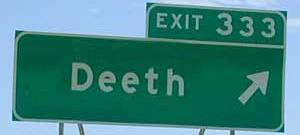"The Cold Equations" put a young space pilot in a dilemma. He has an urgent cargo of medical supplies and just enough fuel to land exactly with that weight and no more. But the ship is overweight; there's a young stowaway, innocently unaware of the laws of man and physics. Someone or something has to be sacrificed.
So it is in politics. But at least the pilot in the story had the decency to feel bad about it.
Rocket fuel is highly corrosive, as is political money, but nothing moves without it. And even post-Citizens United, the supply is sub-infinite. Excess weight gets jettisoned. Players get cut.
Usually hose cuts are in the second and third string. But if circumstances demand it, could Republicans cut their losses... at the top? Ezra Klein considers "Romney's Nightmare Scenario":
Romney only controls the money raised by his campaign. The money raised by the RNC is controlled by the RNC. The money raised by Karl Rove’s American Crossroads super PAC is controlled by Rove and his partners. And while these groups want Romney to be president, they are not solely devoted to the task of electing Romney as president. If they are devoted to anything, it’s to blocking Obama.And things... aren't turning around. The Onion gets it right yet again: Romney Campaign Reboots For 72nd Consecutive Week.
The RNC and the super PACs know that their money is becoming less and less useful in the presidential race. At this point, voters know Obama very well, and they know Romney well enough. Swing state voters have seen enough ads to last them a lifetime. Sinking a few more dollars into the presidential campaign just isn’t going to do much. The same can’t be said for House and Senate races, where voters have less information about the candidates and are more susceptible to advertising.
Which leads to Romney’s nightmare scenario: If things don’t turn around for Romney soon, those super PACs may give up on the task of electing Romney as president and turn to the task of encircling Obama’s second term with a Republican House and a Republican Senate.
This isn't over yet, but in the 3 1/2 weeks since Romney's acceptance speech was overshadowed by an empty chair, there's been a definite shift in dynamics in Obama's favor. Not necessarily in the Democrat's favor, but in Obama's favor. The leads in swing states are getting a little wider, the paths to electoral college victory for Romney are getting narrower.
I've seen this happen before: in 1996. By mid-October, Republican candidates were openly talking about needing a GOP Congress as a check on Bill Clinton. Which, if you're Bob Dole, is Not. Good. But he had to have known that race was over the day Clinton signed welfare "reform" and took the Cadillac Food Stamp Queen "issue" away until... well, until Mitty the Moocher resurrected it as 47 Percent.
No, Bob Dole knew he was going to lose. Very few candidates go into election day with actual doubt. Sure, there's a few without a clue who think they're going to win, but few seats are in genuine partisan doubt, and of the few that are there's usually a strong favorite.
Given these realities, the Iowa Republican Party's decision to give ALL state House and Senate candidates equal donations, $500 per House race and $1000 per Senate. Some of that money, frankly, is wasted. Even worse, it's being wasted twice: once by giving it to no-chance candidates, once in denying it to contenders in close races. (How much of that even-handedness about building a bench of "Campaign For Liberty" types to full the party activist slots of the future?)
Not my party so not my problem, but in politics as in physics certain principles are universal.

2 comments:
I would expect that money will flow into the competitive statehouse races at some point in October, a diversion of funds from national candidates, similar to the 1996 races, when money moved away from Jim Ross Lightfoot in the Senate campaign against Harkin, and moved into state Senate races, with five Democratic incumbents losing as a result. It's been clear for sometime that Mitt Romney is unlikely to win, but it's also starting to appear that additional Super Pac money for presidential ads is really chasing diminishing returns. I suspect that Karl Rove and others realize that a (relatively) small amount of money might have better returns if spent on state legislative races, on US house races and on Senate races. Given too that Republican (and presumably Republican-leaning and persuadable voters) vote later, Republican Super Pacs will still have the opportunity to reach these voters in October.
As for Democratic early-voting: the D's have always long had a better early game (Senator Liz Mathis for example), but I was frankly surprised to see lines for voting. I think that the enthusiasm gap has vanished.
Oh yeah - kudos on the reference to "one-hit" wonder, Tom Godwin. His little-known book from 1960 (Space Prison) was a great favorite of mine growing up.
Post a Comment